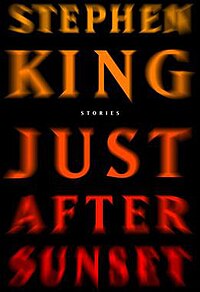We've spent the month of May here at What She Might Think showcasing a story a day in celebration of National Short Story Month. Rather than having a story-for-today, here is the list of every selected story, along with a link to its original post (and from there, a link to the story's text).
Day 1-4: "Diagnostic Drift" by Michael Martone
Day 5: "The Brewsters" by Laura Ellen Scott
 |
| Centennial Statue by Alan Cotrill, at Coshocton, Ohio Public Library |
Day 6: "The Juniper Tree" (folkstory, no author)
Day 7: "All the Anne Franks" by Erik Hoel
Day 8: "Roots" by Chadwick Redden
Day 9: "Concerning Ghosts" by Michael Stewart
Day 10: "Mirrors" by Carol Shields
Day 11: "The Red Bow" by George Saunders
Day 12: "Young Goodman Brown" by Nathaniel Hawthorne
by Joyce Carol Oates
Day 14: "Hands" by Sherwood Anderson
Day 15: "For Sale" attributed to Ernest Hemingway
Day 16: "Of Missing Persons" by Jack Finney
Day 17: "Old Lady Lloyd" by L.M. Montgomery
Day 18: "The Tell-Tale Heart" by Edgar Allan Poe
Day 19: "The Baby-Sitter" by Robert Coover
Day 20: "Bartleby the Scrivener" by Herman Melville
Day 21: "The Red House" by Ian T. MacMillan
Day 22: "The Things They Left Behind" by Stephen King
Day 23: "The Still Point of the Turning World" by Patricia Highsmith
Day 24: "The Lottery" by Shirley Jackson
Day 25: "Show-and-Tell" by George Singleton
Day 26: "The Daredevil's Wife" by Tom Noyes
Day 27: "Story About the Body" by Robert Hass
Day 28: "Speaking of Courage" by Tim O'Brien
Day 29: "Inland Sea" by Stuart Dybek
Day 30: "The River" by Flannery O'Connor
This is not an ever-fixed list. Certainly, some of the greats have been left out, such as Virginia Woolf, F. Scott Fitzgerald, William Faulkner, Kate Chopin, Raymond Carver and many others. Should they be on here? Absolutely. Next year, then. Next year. But this is a fine list, she thinks, of short stories and their writers--both living and not, whose work shows why the genre has continued, will continue, and should be celebrated this month and every day until it returns with flowers.
If you chose a story for today, what would it be?














![Newspaper article where The Tell-Tale Heart first appeared The New York Sun. [From the Pioneers.] The Tell-Tale Heart. By Edgar A. Poe. Art is long and Time is fleeting, And our hearts though stout and brave, Still, like muffled drums, are beating Funeral marches to the grave. [Longfellow. Then text of story begins.](https://blogger.googleusercontent.com/img/b/R29vZ2xl/AVvXsEi0A6rP0oD0wX-3X9YU8E1H-Ae38Ql7l7WIPWE5DAl0Kyj4ODhHlrFEKfXt61I0TmRyvetcziDeTSnY3LzRVQANRfPf48dvDLBUz1kZ5GG_0UyA1UeLoMJS0wJ__JfWIqLFo4hGc-2KUDI/s1600/tell-tale+heart.jpg)







